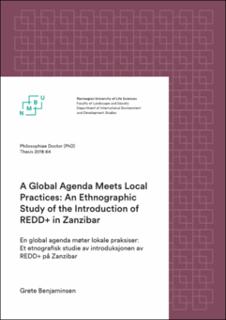A global agenda meets local practices : an ethnographic study of the introduction of REDD+ in Zanzibar
Doctoral thesis
Permanent lenke
https://hdl.handle.net/11250/2719839Utgivelsesdato
2018Metadata
Vis full innførselSamlinger
Sammendrag
This thesis discusses REDD+ as an example of a highly ambitious global environmental policy framework conceived at international levels and implemented at local levels in forest communities across the Global South. The main objective is to investigate the encounter between the REDD+ global agenda, that is, the effort to reduce forest-based CO2 emissions and thereby mitigate climate change, and the pre-existing social contexts to which REDD+ is introduced, and which REDD+ aims to regulate, modify and change. Inspired by scholars working within two partly overlapping fields of research, Political Ecology and the Anthropology of Development, this investigation of REDD+ explores both the discursive powers inherent in REDD+ and the assumptions on which REDD+ is based, as well as the particularities of existing socially embedded practices, meanings and relationships at local level in Zanzibar. I denne avhandlingen diskuteres REDD+ som et eksempel på et ambisiøst globalt miljøpolitisk rammeverk utviklet på internasjonalt og implementert på lokalt nivå i ulike skogssamfunn i det globale sør. Avhandlingen har som hovedmål å utforske interaksjonen mellom REDD+ som en global agenda - der REDD+s ambisjoner om å redusere skogsrelaterte CO2-utslipp og dermed også klimaendringene står sentralt - og de sosiale kontekstene hvor REDD+ blir introdusert, og som REDD+ har som mål å regulere, tilpasse og endre. Inspirert av forskere innenfor to delvis overlappende forskningsområder - politisk økologi og utviklingsantropologi - utforskes REDD+- relaterte diskurser, med de antagelser og tatt-for-gittheter som REDD+ rammeverket baseres på, samt egenskaper og særtrekk ved eksisterende sosiale praksiser, relasjoner og mening på lokal nivå.

